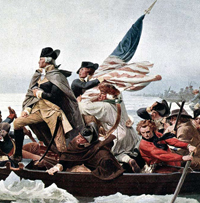Scholars explore seminal works that shaped our nation’s history
Have you ever stayed up all night reading a book you just couldn’t put down? Felt unreasonably annoyed when a well-meaning friend interrupts your reading time? Found that a book that you’ve read changed your mind and challenged you to change the world you live in?
If this sounds familiar, Michael Winship, the Iris Howard Regents Professor of English, says you’re not alone. Books always have captured the imagination of readers, inspired reforms and revolutions, changed hearts and minds and altered people’s lives. nearly 600 years after the invention of printing from moveable type, books continue to stir passions and incite controversy.
A bibliographer and book historian, Winship can’t remember a time when he wasn’t surrounded by books. as an undergraduate at Harvard College, he repaired rare books in the special collections library. after graduation in the early 1970s, he continued to work as a bookbinder before discovering he was more interested in the contents of books than their construction.
Today, Winship researches publishing and the book trade in america and teaches courses on “The American Bestseller.” He recently edited the third volume of “a History of the Book in america” (University of north Carolina Press, 2007) series, titled “The Industrial Book, 1840-1880,” which focuses on a period that dramatically changed the publishing industry and how Americans read books.
“Before the 1830s, book-making was a craft, but during the mid 19th century book production moved into factories. The speed at which books could be produced greatly increased, making them more accessible to the public,” Winship says. Literacy increased during the industrial era, and the reasons why people read also shifted.
“During the colonial period, people read as a matter of religious importance. It was a spiritual requirement to be able to read the Bible,” Winship says. “That didn’t go away in the industrial era, but people began to realize they needed to learn to read to become an active citizen and participate in the workforce. There was a sense that you had a civic duty to read.”
However, in today’s electronic era, critics worry that modern citizens are more likely to tune in to YouTube. com or check out their favorite blog before picking up a book. But, books still play an important role in our culture, Winship argues, and they have an intrinsic value that’s impossible to quantify.
Like no other mass medium, books have the ability to crystallize a point in history or serve as a catalyst for public opinion. Great books can foster nationwide discussion or provide a framework for the way people understand an issue. and, every once in a while, a book comes along that changes everything.
Winship invites you to take a journey through U.s. history with seven bestselling books that changed american hearts and minds and continue to address issues of relevance today. To limit the scope of the selection, Winship has chosen books by American authors published between 1776 and 1976.
“These books were consciously written to expose a problem, challenge the status quo, and issue a rallying cry for change,” Winship explains. “In each of these cases, the American people heard the call and took action that changed the course of our nation’s history.”
